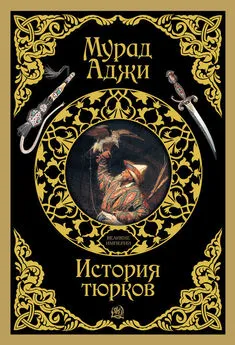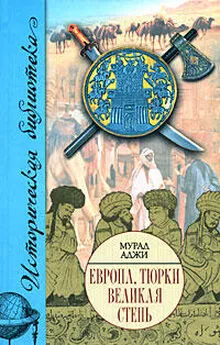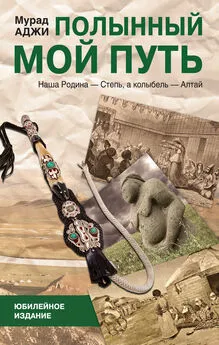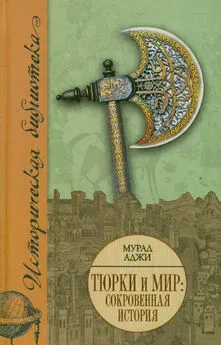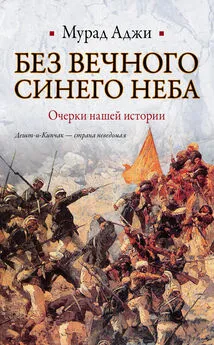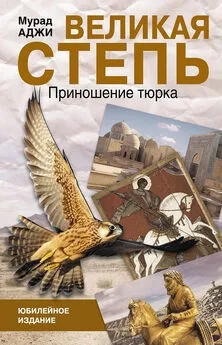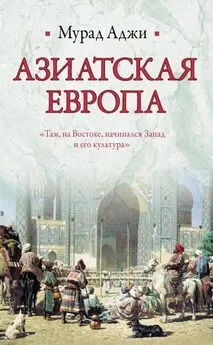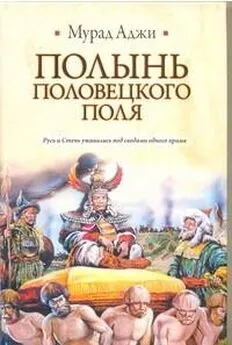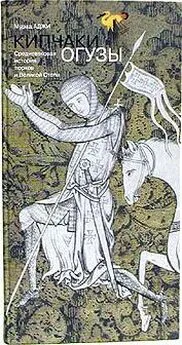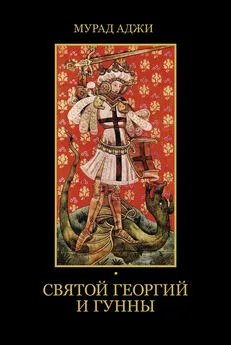Мурад Аджи - История тюрков
- Название:История тюрков
- Автор:
- Жанр:
- Издательство:АСТ
- Год:2015
- Город:Москва
- ISBN:978-5-17-087192-6
- Рейтинг:
- Избранное:Добавить в избранное
-
Отзывы:
-
Ваша оценка:
Мурад Аджи - История тюрков краткое содержание
В первой книге речь идет о становлении тюрков как народа, о его расселении по Евразии, о Великом переселении народов. Оно зародилось на древнем Алтае и к IV веку достигло Европы. Первыми узнали о высокой культуре тюрков Индия и Персия. Потом – Кавказ и Урал, Византия и Рим… Автор будто открывает окно в пленительное прошлое России. Вторая книга рассказывает о Средневековье, о его «темных веках». Уж слишком много загадок оставило то время! Каким стал мир после смерти Аттилы? Раскол Церкви, рождение ислама, Крестовые походы, походы Чингисхана, инквизиция – все это события, тесно связанные между собой. В их череде тюрки были и героями, и жертвами.
История тюрков - читать онлайн бесплатно ознакомительный отрывок
Интервал:
Закладка:
Мурад Аджи
История тюрков

Мурад Эскендерович Аджиев (род. 1944) – географ, писатель, кандидат экономических наук, доцент, автор концепции Великого переселения народов, зародившегося на Алтае.
Более 20 лет посвятил исследованию предшественницы Руси – степной державы Дешт-и-Кипчак.
В этот сборник вошли две книги, переработанные специально для юбилейного издания.
Предисловие
Эту книгу не надо читать тому, кто не знает пьянящего запаха полыни, будоражащей кровь емшан-травы.
И тот, кто в вороном коне не видит гарцующей красоты, а в степной песне – услады сердцу, пусть тоже отложит ее, и он не поймет автора.
Пожалуйста, не берите ее и те, кому не интересно прошлое и будущее, кому безразличны предки и потомки.
Она не для вас.
Так начиналась моя книга «Полынь Половецкого поля», увидевшая свет в 1994 году. После нее были новые исследования и новые книги, в них много неожиданного даже для меня самого.
Думаю, строки о емшан-траве вполне могли стать эпиграфом ко всем моим книгам, потому что адресованы они самым неравнодушным читателям на свете, тем, у кого душа наполнена Небом.
Этой духовной общности людей в разное время давали разные имена. Кипчаки, огузы– лишь два из них. Кипчаки когда-то передали свое имя великой стране Дешт-и-Кипчак, а огузы подарили ей мудрость. Их и называю я в подзаголовке книги. А как быть с десятками других названий, оставивших след в истории? По моему глубокому убеждению, здесь справедливо всего одно обобщающее слово – тюрки.
Предвижу гнев иных читателей, у которых слово «тюрк» вызывает враждебность и отторжение. Сама идея о том, что тюрки – это предки многих народов мира, кажется им невероятной. Такой же невероятной, как и мысль о тюркских корнях собственной родословной.
Но что мы знаем о тюрках? Кто они такие? Как возникла эта общность людей? И что она дала миру? Многие пытались найти ответ. Искал и я. А когда нашел, поразился его простоте. Об этом рассказывает сборник, который вы держите в руках.
Книги, вошедшие в него, издавались не один раз в России и в других странах, их рекомендуют студентам и школьникам для расширения кругозора. Но, читая, надо помнить, что перед вами не учебник и не пособие для вузов, где каждая строчка согласована и одобрена начальством. Я рассказываю о народе так, как подсказывает мне сердце. И знания, конечно. Поэтому и назвал новый сборник «История тюрков. Такими знали нас…».
Так кто же такие тюрки? У каждого свой ответ.
Мурад Аджи
Кипчаки. Древняя история тюрков и Великой Степи

Murad ADZHI
THE KIPCHAKS An Ancient History
of the Turkic People and the Great Steppe
The Steppe is our Homeland
and the Altai is our cradle
Introduction
Many people, in fact billions of them around the Earth, speak Turkic languages today, and have done so since the beginnings of history, from snow-swept Yakutia in Northeast Asia to temperate Central Europe, from chilly Siberia to torrid India, and even in a good many villages in Africa.
The Turkic world is vast and diverse. Turks are its largest tribe. They are the title nation of Turkey, a big country in West Asia and a long-familiar name for the rest of the world for its distinct identity, ancient customs and traditions, and high and unique culture, a subject of a myriad of books and features.
At the other end of the Turkic world, the Tofalars, numbering only a few hundred, are not someone you can tell much about. It’s a sure bet they are hardly known to anyone beyond their dense Siberian forests and the couple of villages they call home town. But then, the Tofalars, perhaps, still speak the original, ancient Turkic tongue after many centuries of only occasional contacts with outside cultures that could distill their speech with borrowings.
The Turkic world is great indeed, and thoroughly enigmatic, too. It is like a cut diamond, its every facet a nation – Azerbaijanis, Altaians, Balkarians, Bashkirs, Gagauzes, Kazakhs, Karaims, Karachais, Kyrgyz, Crimean Tatars, Kumyks, Volga Tatars, Tuvans, Turkmen, Uighurs, Uzbeks, Khakass, Chuvash, Shorians, Yakut – too many names to reel off in the same breath.
Dozens of peoples live in the Turkic world – all alike and different at the same time. You can always tell where they belong, from the special sounds and undertones of their speech. Which means a word that is one thing in one place may be a completely different thing in another. This diversity of meaning makes the Turkic languages fathomless, on top of their simplicity and ancient heritage.
They were not always that different, though. There was a time, too long ago, when all members of the Turkic race spoke one tongue that everyone understood in every corner of the Turkic world. Around two thousand years ago, they started for various reasons to move away from one another, geographically and linguistically, from their next of kin and their common tongue, developing their endemic dialects that were a closed book to outsiders. For a while, they were keenly aware of their common ancestry and remembered their shared language that they could still speak at bazaars and fairs drawing merchants from far away.
Their common primeval language provided a framework for belles-lettres . Poets and story-tellers honed every word of their writings, so they could then caress the ear of the Turkic world at large. Besides, the common language was spoken by government officials mustering the troops or collecting taxes from their subjects. Large empires, from end to end, spoke and wrote Turkic.
Is it only the language that makes one Turkic nation different from another? Is it the linguistic diversity that gives brilliance to the diamond we call the Turkic world?
Everything is much more complex than it looks on the surface at times.
Can you image, some communities on Earth are ignorant of their Turkic origins and will never believe you if you tell them who they are…. They were conquered, at one time or another, and forbidden, on pain of death, to speak their native tongue. They just forgot it clean, out of fear of reprisal. And with it their forefathers and all that had come before…. They were now people without memory or knowledge of their real past.
This is the kind of thing that happened to people on our planet, though.
Of course, these people have visages that look exactly like the faces of their ancestors (what the genes would then be good for?). Take the Austrians or Bavarians, Bulgarians or Bosnians, Magyars or Lithuanians, Poles or Saxons, Serbs or Ukrainians, Czechs or Croats, Burgundians or Catalans…. Nearly all of them blue-eyed and fair-haired (exact replicas of the ancient Turkic men and women), and all blissfully oblivious of their common roots. Doesn’t that strike you?
Many unsuspicious Americans, Britons, Armenians, Georgians, Spaniards, and Italians have Turkic blood flowing in their veins. And especially Iranians, Russians and French. They, too, wear the unspoiled faces of their ancient Turkic forerunners, and they, too, are dead sure they are anything but….
A sad enough story. It has been made that way, though – sad, or more accurately, broken before it could be written to the end.
The Cossacks are what you can label an exception: a nation – yes and no, a tribe – depends on the way you look at it. If you will understand it, of course. Their true story lurks somewhere behind a veil of cock-and-bull stories. What we have then, in the end, is that the Cossacks have contrived somehow to get lost on the crossroads of Time – they style themselves Slavs, and still remember much of their native Turkic tongue. Indeed, Turkic is palavered informally in some Cossack villages. True, they call it, with tongue in cheek, their kitchen-speak, not native language.
I have pondered for many long years why the Turkic world is so little known to so many people on Earth. Was it by fluke or design? You will hardly find another language with as many nuances and dialects as the Turkic – really, people of common blood, common ancestors, common history speaking different languages and thinking differently of themselves. Why, indeed?
I have stumbled on the answer in history, lost in the mist of times, and I am going to tell it in this book, “The Kipchaks: An Ancient History of the Turkic People.” It will only be an initiation, to be followed up by two more books – “The Oguz: A Medieval History of the Turkic People” and “A New History of the Turkic People.”
Вступление
Наша Родина – Степь, а колыбель – Алтай
На тюркском языке говорило и говорит очень много людей – миллиарды. От снежной Якутии до Западной Европы, от Сибири до жаркой Индии. Даже в Африке есть поселения, где звучит тюркская речь. Велик и необычаен тюркский мир. Самые многочисленные в нем – турки, их более семидесяти миллионов человек. Они живут в Турции, большой стране, известной во всех уголках мира. Известной своим народом, старинными обычаями, высокой и неповторимой культурой. О ней написаны тысячи книг и статей.
Читать дальшеИнтервал:
Закладка:
